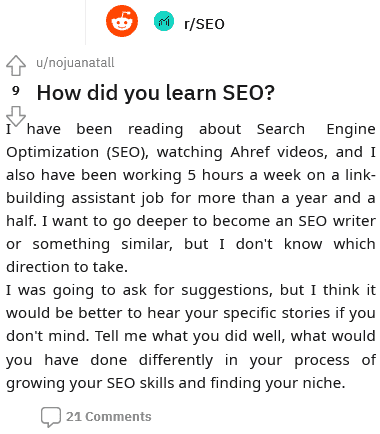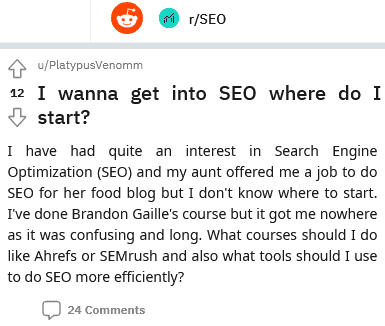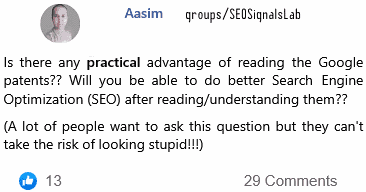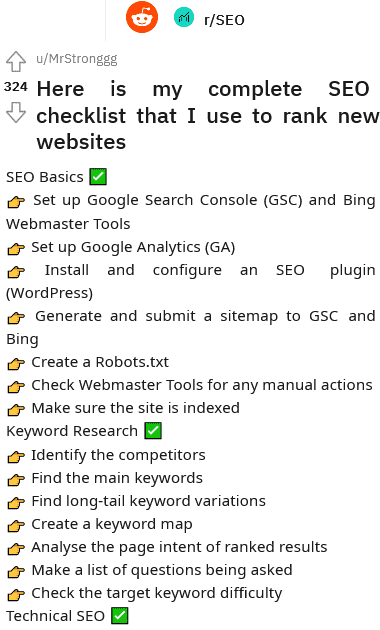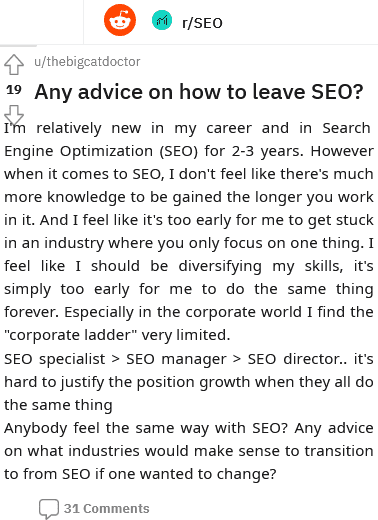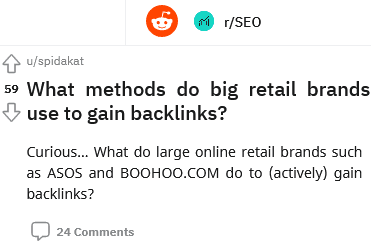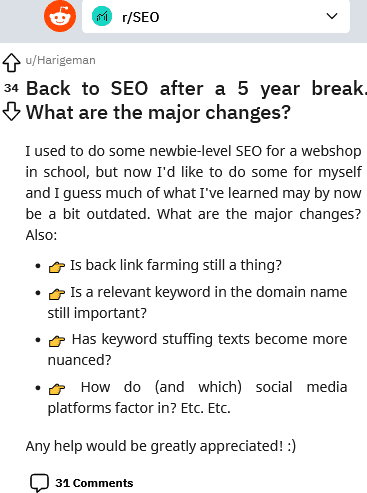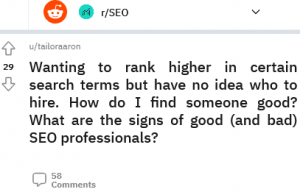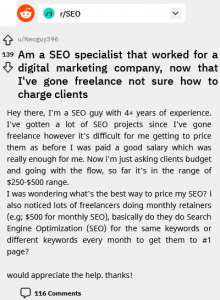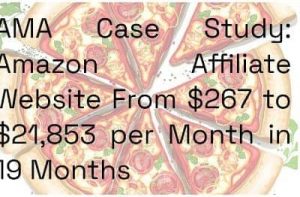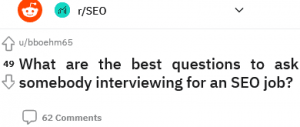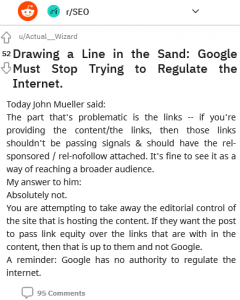How did you learn SEO?
I have been reading about Search Engine Optimization (SEO), watching Ahref videos, and I also have been working 5 hours a week on a link-building assistant job for more than a year and a half. I want to go deeper to become an SEO writer or something similar, but I don't know which direction to take.
I was going to ask for suggestions, but I think it would be better to hear your specific stories if you don't mind. Tell me what you did well, what would you have done differently in your process of growing your SEO skills and finding your niche.
21 💬🗨
📰👈
You should start an affiliate website and find a way to make 100$
write ideas and implement them, see what work and what doesn't and iterate
Try to reach your goal (100$) in less than 12 months
Learn with websites like : learningseo.io
Would WordPress work for that?
yeah, you should use WordPress
InAlteredState
I also started maybe 10 years ago as a teenager, trying to get money mostly to party lol. Also owning a famous website would be cool. Or something.
I learned the basics for that time, studied a lot of grey hat and black hat shit. Invested basically zero money in a saturated niche that I didn't know a damn about. Spammed crappy links and keywords all around. Did zero keyword research, just figured shit would rank eventually. That site is still online, but it maybe has made me 50 dollars in 10 years.
As a stupid teenager, made more sites doing more or less the same stupid mistakes, but related to very random subjects, about which I didn't give a single f*ck. Those are now dead and made me literally zero money.
Fast-forward to 5 years ago, I just wanted to genuinely make a site for helping people, in a niche related to what I do IRL. At the same time I wanted to see if I could do this SEO/marketing properly this time.
I had money, so I could invest in hosting, design, content, etc. I learned a lot about keyword research, which is the freaking basis of any SEO project, like, if you do this wrong, the rest literally doesn't matter. For real, if you don't know how to do it, hire someone to do it for your site the first couple of times, to see how good keywords look like. I also learned some techniques like the Skyscrapper. Backlinko was really a key resource, I read most of his blog posts at the time in a couple of months.
I was actually successful, writing about what I love, helping people asking questions on their queries out, and also making some dollars with affiliate link.
That's more or less my failure/success story learning SEO.
lensupthere
I worked for the largest consumer software company in the 90's.
All of the online search companies wanted access to our customers. I worked directly with them (AOL, Yahoo, Excite@home, google, etc. when they were first starting out). Continued to work with them as the market matured, condensed, was bought out, new technologies, etc.
I learned through that experience and continued to do so since then.
Fast forward to today. I spent several years with a large web/online marketing firm in the SF Bay Area managing SEO and Pay Per Click (PPC). I took some time off my regular stuff and wanted to explore the space. I was able to work with some major brands, many geographically important sites, and many local sites.
During this time I implemented, measured, analyzed and revise and tracked various implementations of Search Engine Optimization (SEO) to determine what worked best.
Schema, ML (Machine Language – text and keyword and sentiment analysis), and other things. Also did the standard things everyone else does. I was able to track and measure across sites and figure out what really works.
There's an outdated model still being promoted, and there's the new model that isn't even being talked about yet. SEO is so convoluted with people trying to make money off of positioning themselves as experts, when they really aren't. And then there are the bellwethers – Ahrefs , MOZ – that preach the lowest common denominator.
Now I do SEO for my own company, and advise friends' companies on what works. And I participate here and offer my learned insight (actual results).
Wow! Your career has been a top notch experience! SEO is labyrinthical indeed.
I am a writer first and foremost but in SEO I saw an opportunity to both make money and spread my thoughts and ideas.
Yes, it is an experience not many will have, not even the so called experts and "go to" sites.
I think multiple sites and implementations of Search Engine Optimization (SEO) is necessary to understand what works, including how and why it works over time.
My observation is that there are very few SEO users that are willing to expand their knowledge through execution and analysis and risk of failure. Rather they opt for "what everyone else is doing" because it's safe to do so.
What they don't realize is that "what everyone else is doing," and what the common sources for SEO information offer, has no upside, only a perceived safety net.
couldbutwont
What's the "new model" mean?
I have a bit of passion about this, apologies in advance for the wall of text.
The new model…Learn about your target market (or your clients target market), learn what phrases and language that target market use, and then speak to them.
Most SEO users do not do this. And it cripples their effort. Most SEO users do not try to understand the business the site is trying to engage. Understanding it will make you better at Search Engine Optimization (SEO) for that business.I spent many years in corporate business development (marketing and sales) for the software company.
Understanding who the customer/consumer is and how to speak to them is a step above the generic SEO implementation.I'm also a coder. I can hand code HTML and Javascript, PHP, mySQL, work with API's etc.
This experience not only has affected my SEO efforts for the better, but also informs emails and other marketing activities to be more successful.Why the standard SEO sources do not talk about this is surprising to me.
They don't know how to, or it's just too complicated for them to engage (because they do not have any marketing or sales or coding background?).Perhaps they should invite these resources to the table to provide input.
Also, even as important, is implementing an iterative montoring, measuring and analysis cycle so that strategies and tactics can be learned, developed, implemented and revised.
The trusted SEO resources do not spend a lot of time on setting objectives, implementing benchmarks, tracking user events (e.g. Google Tag Manager (GTM)) and analysis of data to inform the next revisions/updates.
They also do not embrace ML (machine language) to assist with feeding algorithms. I've been doing this for 5 years with great success. I don't think they know how to.
The new model is being able to apply new methods successfully to SEO efforts and being capable to learn and grow from failure.
The typical SEO resources are afraid to fail (user backlash), so they never do anything cutting edge.
📰👈
MissKatherineC
I worked at the #1 US site in the food/drink lifestyle vertical for seven years. I did analytics to support the sales department (we worked with giant international CPG companies who wanted us to be able to demonstrate Return of Investment (RoI) on their multi million dollar ad packages), inclusive of but not limited to traffic data. There, I interacted daily with people who touched different parts of our SEO strategy, and sat in meetings where we consulted with a former Googler with an extensive network still at the company (NDAs don't prevent everything…).
Basically, I got my feet wet by having them held to the fire repeatedly, lol. Books were a great start, but the real learning was experiential (including tons of A/B testing), as every time Google did an update, everything we did at work went into near-panic mode for a bit because we had to rediscover so much.
Now I run a very small site just for my own business, and goodness is it a relief to not have to worry as much about SEO, but to just have some background in how things can really go sideways so I can avoid certain mistakes and keep abreast of major changes.
bracknelson
For learning SEO, I think to think of a lot of "SEO" techniques as just good practice & it develops your skills or improve your learning: Here is what you need to know for Search Engine Optimization (SEO):
• The most important thing is the canonical link tag: The canonical link tag represents an absolute path, that you would like to represent your page in a search engines index, to reduce redundant indexing.
• Content is king: A lot of SEO magic is also actually helping the search engines find the content you have. Great content will draw visitors, but if you apply just a few tweaks and improvements to help Google find your great content you'll score a lot better.
Fix grammar errors. Write naturally and clear. If your content is well written & valid it will be respectfully indexed.
• Validate your markup: Just because Google's markup is trash is not an excuse for your markup to be trash. If the search bot has to struggle to make sense of your page, no matter how glorious your content is, it will screw you when it indexes your page.
• Use markup that is appropriate to first structure your content and secondly describe it. Be involved with your code and you will be well-loved.
• SEO bots do not care how pretty, usable, or interactive your page is. Put all Cascading Style Sheets (CSS) and styles in an external stylesheet.
That is all you need to know to absolutely conquer SEO. Once you have mastered SEO the next subject will be Search Engine Marketing (SEM).
📰👈
For Business Owners, Do you Prefer Learning SEO for Free or Paying Services?
Have You or Your Team got Periodic Time to Learn SEO News?
Doesn’t Google implement anything in SEO that wasn’t mentioned in the Patent?
SEO Tips To Get Started: Keyword Research, HQ Content, Backlinks, Traffic
13 Tips To Collect Organic Keywords and Traffic
Getting Thousands of High-Quality Backlinks
